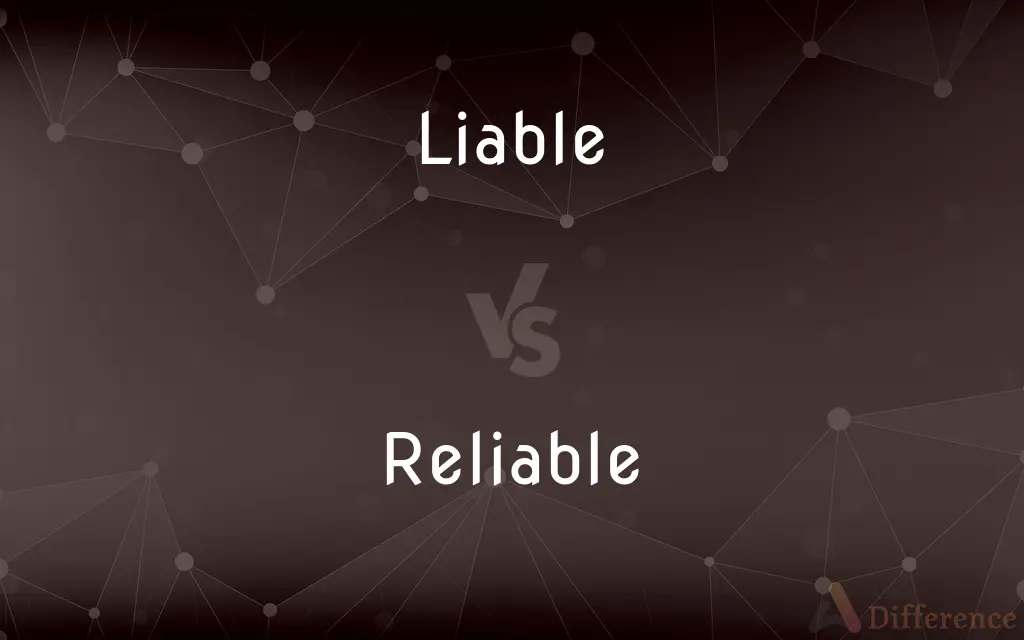Liable vs. Reliable — What's the Difference?
By Tayyaba Rehman & Fiza Rafique — Updated on April 29, 2024
Liable refers to legal responsibility or likelihood, while reliable describes dependability or consistency in performance.

Difference Between Liable and Reliable
Table of Contents
ADVERTISEMENT
Key Differences
Liable often pertains to legal accountability or the possibility of something occurring, such as being liable for damages in a lawsuit. On the other hand, reliable emphasizes a quality of trustworthiness and consistency, like a reliable car that seldom breaks down.
In legal contexts, being liable means one is subject to certain legal consequences due to actions or omissions. Whereas reliable is used to describe someone or something that consistently performs well or behaves as expected over time.
Liable can also imply a negative outcome, such as being liable for a debt, suggesting a duty to pay. In contrast, reliable connotes positive attributes, like dependability in fulfilling promises or meeting expectations.
The term liable is often used in risk assessments, where it signifies a higher probability of an adverse event happening. Conversely, reliable indicates a lower risk of failure and a higher probability of satisfactory performance.
When considering personal characteristics, someone liable might be at risk of committing errors due to carelessness or oversight. Whereas a reliable person is characterized by precision, carefulness, and the ability to be depended upon.
ADVERTISEMENT
Comparison Chart
Definition
Legally responsible or likely.
Dependable, trustworthy.
Connotation
Often negative.
Generally positive.
Usage Context
Legal, risk assessment.
Performance, dependability.
Reliability
Refers to probability.
Refers to consistency.
Personal Trait
Prone to errors or risks.
Characterized by dependability
Compare with Definitions
Liable
Financially responsible.
The company is liable for any harm their products cause.
Reliable
Trustworthy in nature.
For reliable results, follow the instructions carefully.
Liable
Subject to legal obligation.
He is liable for the damages caused by his negligence.
Reliable
Able to be trusted.
He's a reliable source of information.
Liable
At risk of experiencing something usually unpleasant.
You're liable to get lost if you don't follow the map.
Reliable
Dependable in times of need.
The tool kit is reliable for home repairs.
Liable
Held accountable in law.
The court found him liable for the breach of contract.
Reliable
Performs consistently well.
This model of car is known for being reliable.
Liable
Likely to do or to be something.
Without proper care, these plants are liable to die.
Reliable
Maintains a standard of strong performance.
She is a reliable employee who always meets her deadlines.
Liable
Legally obligated or responsible
Liable to pay for damages.
Liable for negligence.
Reliable
Capable of being relied on; dependable
A reliable assistant.
A reliable car.
Liable
Subject to undergoing or suffering something, especially something unpleasant. Used with to
We did not use glass containers because they are liable to breakage.
Reliable
Yielding the same or compatible results in different clinical experiments or statistical trials.
Liable
Likely. Often used with reference to an unfavorable outcome
People who are sleep deprived are liable to make mistakes.
Reliable
Suitable or fit to be relied on; worthy of dependence, reliance or trust; dependable, trustworthy
Liable
Bound or obliged in law or equity; responsible; answerable.
The surety is liable for the debt of his principal.
Reliable
Such that either a sent packet will reach its destination, even if it requires retransmission, or the sender will be told that it didn't
Liable
Subject; susceptible.
This crime is liable to imprisonment for life.
A man liable to heart disease.
Reliable
Something or someone reliable or dependable
The old reliables
Liable
Exposed to a certain contingency or causality, more or less probable.
Reliable
Suitable or fit to be relied on; worthy of dependance or reliance; trustworthy.
The best means, and most reliable pledge, of a higher object.
According to General Livingston's humorous account, his own village of Elizabethtown was not much more reliable, being peopled in those agitated times by "unknown, unrecommended strangers, guilty-looking Tories, and very knavish Whigs."
Liable
Likely.
Reliable
Worthy of reliance or trust;
A reliable source of information
A dependable worker
Liable
Bound or obliged in law or equity; responsible; answerable; as, the surety is liable for the debt of his principal.
Reliable
Conforming to fact and therefore worthy of belief;
An authentic account by an eyewitness
Reliable information
Liable
Exposed to a certain contingency or casualty, more or less probable; - with to and an infinitive or noun; as, liable to slip; liable to accident.
Proudly secure, yet liable to fall.
All human things are subject to decay.
Reliable
Worthy of being depended on;
A dependable worker
An honest working stiff
A reliable source of information
He was true to his word
I would be true for there are those who trust me
Liable
At risk of or subject to experiencing something usually unpleasant;
He is apt to lose
She is liable to forget
Liable
Subject to legal action;
Liable to criminal charges
Liable
(often followed by `to') likely to be affected with;
Liable to diabetes
Liable
Held legally responsible;
Men between the ages of 18 and 35 were liable for military service
Common Curiosities
What makes a product reliable?
A product is considered reliable if it consistently performs its intended function effectively and efficiently over its expected lifetime.
How can reliability be measured?
Reliability can be measured through consistency of performance over time and under different conditions.
Does liability imply fault?
Liability often implies fault or responsibility for a particular situation or action, but in some legal systems, liability can be assigned without fault, as in no-fault insurance policies.
How can an organization improve its reliability?
Organizations can improve reliability by implementing robust quality control systems, training employees thoroughly, and continuously monitoring and refining their processes.
How does legal liability affect businesses?
Legal liability can significantly affect businesses by imposing financial burdens, damaging reputation, or even affecting operational capabilities if not managed properly.
What does it mean to be legally liable?
Being legally liable means one is legally obligated to compensate or rectify any loss or damage caused by one's actions.
Is liability always related to negative outcomes?
While liability often involves responsibility for negative outcomes, such as damages or losses, it can also refer to any legal obligations, not necessarily negative.
What role does reliability play in consumer trust?
High reliability builds consumer trust as consistent performance assures customers that they can depend on a product or service.
Can a person be both liable and reliable?
Yes, a person can be liable for specific actions while generally being reliable in other aspects of their life or work.
What are the consequences of being liable?
The consequences can include fines, compensation payments, or other legal penalties.
What industries require high reliability?
Industries like aviation, healthcare, and automotive demand high reliability due to the critical nature of safety and performance in these fields.
Can liability be insured against?
Yes, various forms of insurance, such as liability insurance, are specifically designed to cover potential costs arising from legal liabilities.
What are examples of reliable technologies?
Examples of reliable technologies include cloud storage solutions known for their uptime and robustness, and modern automobiles with advanced safety features.
Are there ways to reduce one's legal liabilities?
Reducing legal liabilities can be achieved by adhering to regulations, implementing comprehensive risk management strategies, and maintaining high standards of practice.
How is reliability tested in products?
Reliability in products is often tested through stress testing, quality assurance processes, and long-term performance evaluations to ensure they meet the set standards.
Share Your Discovery

Previous Comparison
Groovy vs. Java
Next Comparison
Klutz vs. ButterfingersAuthor Spotlight
Written by
Tayyaba RehmanTayyaba Rehman is a distinguished writer, currently serving as a primary contributor to askdifference.com. As a researcher in semantics and etymology, Tayyaba's passion for the complexity of languages and their distinctions has found a perfect home on the platform. Tayyaba delves into the intricacies of language, distinguishing between commonly confused words and phrases, thereby providing clarity for readers worldwide.
Co-written by
Fiza RafiqueFiza Rafique is a skilled content writer at AskDifference.com, where she meticulously refines and enhances written pieces. Drawing from her vast editorial expertise, Fiza ensures clarity, accuracy, and precision in every article. Passionate about language, she continually seeks to elevate the quality of content for readers worldwide.
















































